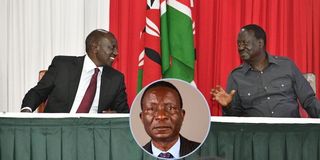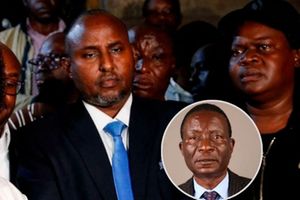
President Willam Ruto and ODM party leader Raila Odinga during the MoU signing event at KICC on March 7, 2025. (Inset) Slain Kasipul MP Charles Ong'ondo Were.
The latest threat by some Raila Odinga’s Orange Democratic Movement (ODM) leaders to dissolve a political union with President William Ruto following the gangland killing of Kasipul MP Charles Were mirrors predictable decisions the region has taken in walking out of past political pacts.
ODM national chairman Gladys Wanga, who has been supporting the broad-based government, on Saturday uncharacteristically appeared to link state machinery to the death of the slain lawmaker, in a pronouncement that fuelled the simmering dissent against the Memorandum of Understanding (MoU) between ODM and Dr Ruto’s United Democratic Alliance (UDA).
Her sentiments and those of other MPs, who spoke at the late MP’s home in Homa Bay, appear to give momentum to lone voices like that of Siaya Governor James Orengo, who has been critical of the political deal.
"Who killed Were and why? That we want to know, and not in the far future; in the near future. We have said we are working together (with President Ruto), but we did not sign up for the assassination of our members," said Ms Wanga.
"As the national chairman of the ODM party, I also want to make it very clear that Homa Bay County and the entire Nyanza region is an ODM zone. The next time I see people in this region shouting 'UDA', we will not agree; we will not accept. It will not happen under my watch as the national chairman of the ODM party," she charged.
National Assembly Minority Whip Millie Odhiambo argued that the killers were people who understood government systems and timings and that the killing may have been intended to weaken ODM and its leaders, including Mr Odinga.
Homa Bay County UDA Secretary General Silas Jakakimba, also condemned sentiments linking the state with the killing of Mr Were.
“We condemn the rising tirade of irresponsible remarks and increasingly intolerant voices from sections of elected and non-elected leaders within and from Homa-Bay County,” said Mr Jakakimba.
“It is on record that the ruling UDA leadership, both at national and county levels, have called for speedy investigations into the brutal murder of Kasipul MP Ong'ondo Were. We wish to candidly reiterate that Kenya is a multiparty democracy and the spaces and unit levels for its consequential practice are the counties spread out in 47 regions of the Republic, including Homa-Bay County,” he added.
The anti-government sentiments following the killing come even as Mr Orengo sustained his onslaught against the political arrangement between President Ruto and Mr Odinga.
“We are setting a bad precedent in our country in the name of signing post-poll pacts. I want a situation where in future, if Raila is not on the ballot, our grandchildren can contest and win elections or lose. Let them lose fairly but not because of a bad precedent set by us,” said Mr Orengo at the weekend.
“I have worked with all the presidents of this country and believe me when I tell you the country is on a bad trajectory. I worked with Argwings Kodhek, I saw the late Tom Mboya try making things work in this country before he was killed; I worked with Presidents Daniel Moi, Mwai Kibaki, Uhuru Kenyatta and now President William Ruto,” he noted further.
But while speaking in the company of President Ruto who is on a three-day tour of Migori, Mr Odinga’s elder brother, Oburu Oginga, told Mr Orengo to quit ODM if he is opposed to the broad-based government.
“Those who think this broad-based government is wrong are vomiting on us from within. Why don’t they step outside and vomit there?” said Oburu.
Since 1966, Luo Nyanza, where politics has revolved around the same faces, has had a predictable approach of hostility against the incumbent, a reconciliation followed by a bitter fallout.
It is the same story of the late Jaramogi Oginga and the founding president Jomo Kenyatta, Jaramogi and the late President Daniel Moi as well as Mr Odinga and Moi. A similar script has also played out between Mr Odinga and the late President Mwai Kibaki, former President Uhuru Kenyatta and now President Ruto.
Uriri MP Mark Nyamita, however, observed that the predictable script has always been sustained by individuals who can only win elections when Mr Odinga is on the ballot.
“There are a bunch of politicians who believe that when Baba is not on the ticket to lift their hands, then they have no chance of survival. That is why even when Baba (Raila) has shown the way that we work in this broad-based arrangement, some are out there trying to fight it,” said Mr Nyamita.
The fallout between Jaramogi and Mr Kenyatta in 1966 was so bitter. It played out in 1969 in what is known as ‘Kisumu massacre’ when President Kenyatta visited Kisumu to open Jaramogi Oginga Odinga Teaching and Referral Hospital – then known as Russia. Scores were killed, and several others were killed when the police opened fire at the crowd as the President’s entourage drove out. The late Jaramogi is said to have unsuccessfully sought reconciliation with Mr Kenyatta during his final years in office.
President Moi would later appoint Jaramogi chairman of Cotton Lint and Marketing board when he assumed power upon the death of Mr Kenyatta, who died on August 22, 1978. Three years into the Moi Presidency in 1981, time appeared ripe for Jaramogi’s return to electoral politics.
Then Bondo MP Hezekiah Ougo suddenly resigned his position to pave the way for Jaramogi’s entry to Parliament. But the truce between Moi and Jaramogi would be short-lived after the latter attacked Kenyatta as a ‘land grabber.’ Moi issued a statement condemning Jaramogi for disrespecting the late President Kenyatta and later fired him. It was back to the political cold for Jaramogi as all political doors were slammed on him. And for close to 20 years, Jaramogi and President Moi remained sworn enemies as the former led the push for multipartism. There were attempts to reconcile before Jaramogi died in 1994.
However, at his burial, then young Turks led by Mr Orengo, Mr Odinga, Prof Anyang’ Nyong’o ignored the existing talks between the two leaders.
In a scene similar to what Mr Orengo did at the burial of Mr Odinga’s bodyguard, the leaders led a scathing attack on Moi.
During Mr Odinga’s bodyguard's burial, attended by both Mr Odinga and President Ruto, Mr Orengo went on a tirade against the broad-based government.
“…I urge you, praise singing will not take us anywhere, I urge you to tell your leader the truth. I don’t do song praise. This country will go to the dogs again if the kind of language I’m hearing here continues. If we have something being brought to Siaya, it is a matter of right, not that we are being given as a favour,” Mr Orengo charged at the president during the burial in Siaya on April 12.
Prof Nyong’o would later separately go for Dr Ruto’s jugular, accusing his administration of undermining devolution and returning the country to the old constitutional order of the ‘Nyayo’ era.
“…the truth is that the Ruto regime has decided to go back to the pre-devolution times of the Nyayo era. The 2010 constitution is a hindrance to its primitive (sic) accumulation schemes, which will affect not only devolution but the very ethos of building a national democratic and development state,” Prof Nyong’o stated in his hard-hitting statement.
The script on sustaining political hostility before entering a deal followed by a fall-out continued when Mr Odinga entered a cooperation agreement with Kanu in 2001. His National Development party (NDP) entered a merger deal with the ruling Kanu, with the opposition supremo being named the party’s Secretary General. President Moi also appointed him Energy Minister. The pact was short-lived when he fell out with Moi in the run-up to the 2002 election.
Mr Odinga would proceed to team up with Mwai Kibaki and other opposition leaders to defeat Moi’s candidate, Uhuru Kenyatta through Narc. When Narc, whose victory was attributed to Mr Odinga came to power in 2002, Mr Odinga was named Roads, Public Works and Housing Minister. In the pre-election agreement, Mr Odinga was promised a Prime Minister position, which required amendments to the constitution.
Sharp differences quickly emerged over the position. The differences would play out in the 2005 referendum that saw Mr Odinga and his allies kicked out of the government by President Ruto. The region once again found itself in the opposition until after the disputed 2007 presidential election that saw Mr Odinga serve as Prime Minister in a grand coalition with President Kibaki.






